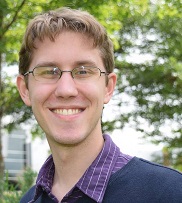I’m extremely lucky to be funded by the NSF Graduate Research Fellowship Program. One of my obligations to the NSF in light of this is a write-up of my activities for the past year. I thought it would be interesting to post my write-up here. I apologize for its rough quality - I wrote it in one-sitting!
This past year, I have been primarily engaged in creating a new undergraduate course on Computational Thinking meant for non-Computer Science majors, assisting Dr. Dennis Kafura. This course uses an innovative Data Science approach, requiring us to create an entire curriculum from the ground-up. Students get a chance to grapple with data from their own discipline in a collaborative learning environment with an emphasis on mastery learning and authentic learning experiences. In Fall 2014, we ran a pilot course for 20 students from over 10 different majors - in Spring 2015 we have 40 students from over 20 different majors, including a 50%/50% split in gender. The main challenge of this course is scaling up the learning experience to eventually handle hundreds of undergraduates per semester, many of whom will struggle with the material and lack proper motivation - we accomplish this by using innovative pedagogy such as collaborative student cohorts and active learning techniques. As we develop this course, we have an eye towards wide dissemination of the course components even as we try and scale up the material. In addition to a publication at ITiCSE on the pilot offering, we were written up in a local newspaper for the novel pedagogy and technology.
In order to help run this course, I have created a suite of new educational technology resources. The most valuable item is a new block-based programming environment that scaffolds students to write real Python programs - these programs can be converted back and forth freely between the block-based representation and the conventional text-based version. This environment also gives students interactive feedback as they complete assignments, guiding the student through the material and reducing the workload on the instructors. This environment is embedded within a new online learning platform that gives students an immersive experience as they complete coursework - all of their grades and assignments are in one convenient web interface, and they can rapidly switch between classwork and textbook readings. From the instructors perspective, this system tracks individual students’ progress across a number of factors in order to keep track of a large number of learners. Finally, I have continued my work for the CORGIS project: the Collection of Real-time, Giant, Interesting dataSets. This project seeks to make high-quality Big Data sets available to novice learners through a simple-to-use interfaces. At present, we have over 3 dozen ready-to-use libraries across a wide-variety of subjects, empowering students in the Computational Thinking class to find a dataset that speaks to their interests and long-term career goals. Students use these libraries through the block-based programming environment and during their final project, where they must answer real-world problems using computational techniques and a datasets of their own choice. All of these resources are free, open-source, and publicly available.
In addition to my work on this new course and its associated technologies, I have been involved in several smaller research projects and professional development activities. Working alongside my fiance in the Animal Science department, we have created an educational modification of Minecraft meant to organically teach Animal Science concepts (“AnimalScienceCraft”) aligned with FFA standards for middle schoolers - although still in the early stages and seeking funding, we have already presented this research and garnered a lot of positive interest. I have committed many hours to supporting and hosting events for the Computer Science department’s Association for Women in Computing, in my capacity as an officer of the organization - this work is critical to my on-going commitment to promoting women in computing. As a senior graduate student, I have mentored two of my fellow graduate students and two undergraduate students as they conduct research within my ken. At one of the largest conferences in my field (SIGCSE’15, the Special Interest Group on Computer Science Education), I organized a PhD students dinner in order to foster community among the CS Education doctoral community. Finally, I am also serving as Publicity Chair for the education workshop for SPLASH (SPLASH-E’15). I hope to continue many of these efforts even as I continue to develop the Computational Thinking course, conduct informative empirical studies on its participants, and create powerful new educational technology to support it.
